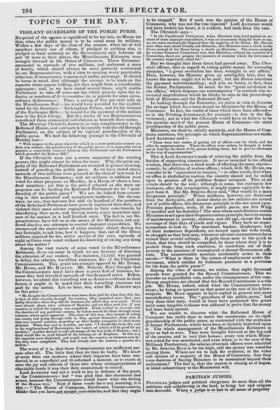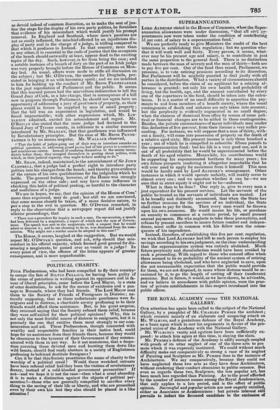PARTISAN JUDGES.
Pommel. judges and political clergymen do more than all the seditious and unbelieving in the land, to bring law and religion into discredit. When a judge is so lost to all sense of propriety so devoid indeed of common discretion, as to make the seat of jus- tice the stage for the display of his own party politics, he furnishes that evidence of his misconduct which would justify his prompt removal. In England and Scotland, where men's passions are not so easily inflamed, the mischief effected by an injudicious dis- play of party zeal in the charge of a judge, is trifling compared to that which it produces in Ireland. In that country, more than in any other, it is essential to the ends of justice that the occupants of the bench should outwardly at least, appear dead to the exciting topics of the day. Such, however, is far from being the case ; and a notable instance of a breach of duty on the part of an Irish judge was very properly brought before the House of Commons on Mon- day last. As usual, efforts were made to stifle all discussion on the subject ; but Mr. O'DWYER, the member for Drogheda, per- sisted in bringing it on with becoming spirit; and we are indebted to him for holding up the conduct of Mr. Baron PENNEFATHER to the just reprobation of Parliament and the public. It seems that this learned person had the marvellous indiscretion to tell the Grand Jury of Cork, in a late charge, that in consequence of a bill now in progress through Parliament, he should not again have an opportunity of addressing a jury of gentlemen of property, as their places would in future be supplied by men of small property ; that the bill was an experiment in legislation, and would be found impracticable; with other expressions which, Mr. LIT- TLErolg admitted, excited his astonishment and regret. Mr. O'REILLY also stated that the same judge had declared to the Grand Jury of Tyrone county, in reference to a similar measure introduced by Mr. STANLEY, that that gentleman was influenced by Revolutionary principles. But the case of Mr. Baron PENNE- FATHER is by no means singular. Mr. WALLACE observed, " That the habit of judges going out of their way to introduce remarks on political questions, in addressing grand Julies, had of late grown to a monstrous and mischievous extent. Instead of conhning themselves to the matter imme- diately before them, they occupied themselves in prating about politics, with which, in their judicial capacity, they ought to have nothing to do."
Mr. SHAW, indeed, maintained, to the astonishment of Sir Joust CAMPBELL, that a judge had a perfect right to introduce party politics into his charges from the bench ; and thereby gave evidence of the nature of his own qualifications for the judgeship which he holds. The general feeling, however, of the House was strongly expressed on the other side ; and may have some influence in checking this habit of political prating, so hurtful to the character and usefulness of a judge.
We are in hopes, we say, that the opinion of the House of Corn' coons thus expressed, may do good; but still we are convinced, that some means should be taken, of a more decisive nature, to put a stop to the evil in question. Mr. O'Dwyse. remarked, in reply to the observation that a newspaper report did not justify ulterior proceedings, that
"There was a precedent for inquiry in such a case. On one occasion, a speech had been delivered by a magistrate, a report of which met the eyes of Govern- ment. The speech was sent to the magistrate, with a request that he would admit or disavow it ; and he not choosing to do so, was dismissed from the com- mission. Why might not a similar course be adopted in this case?"
The House, it seems, laughed at the suggestion. But we would repeat Mr. ODWYER'S question, and ask, why should that mis- conduct in his official capacity, which formed good ground for dis- missing a magistrate, be passed over as venial in a judge? In every point of view, the offence of the latter appears of greater consequence, and is more unpardonable.

















 Previous page
Previous page